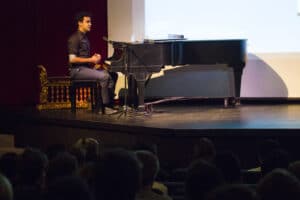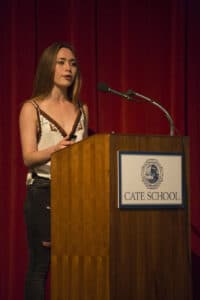Inquiry Day 2017
May 19, 2017

Zac Towbes ’17 was the key note speaker for Inquiry day and presented to the community about the relationship of music, physics, psychology and culture. (©Ashleigh Mower for Cate School)

Senior Olivia Siemens’ inquiry presentation discussed how the brain is shaped by modern politics and what each of us considers facts. (©Ashleigh Mower for Cate School)
Inquiry Day 2017 started with a question about music. What is it about chords – consonance, dissonance, and then the context in which a person experiences them that makes them sound pleasing to the human ear? Senior Zachary Lewis-Towbes took on that question for his inquiry project, presenting his findings to the entire school with the aid of piano, an Indonesian gamelan, slides and audio recordings, forcing everyone to think a little differently about how we listen to music, ubiquitous in our lives from our earliest lullabies.
Ten more seniors chose to dive deeply into subjects that piqued their interest, and it took the rest of the day to hear and experience their findings on subjects as broad as art forgery, the history of tea, and Cate’s town and gown relationship with Carpinteria, as well as a variety of scientific and political topics.
Faculty member Cece Schwennsen, who worked for two trimesters with all the students helping to shape their inquiry experience, says it’s her favorite day of the school year because it’s an opportunity to celebrate student work in a very different way. And she emphasizes that the process, along with the actual subject matter and final presentation, are crucial elements to the method in inquiry.
“They come with an idea or interest that we craft into a research question. Most students started thinking about their projects last summer, with one actually doing a bulk of his research then. They began work during winter trimester and really honed their presentations this spring. They presented a practice session to a group of faculty, who gave them feedback. After that students went back to work to strengthen their arguments, fill in gaps, reorganize their presentations to give some truly outstanding talks.”
If the success of inquiry can be measured by questions, this year’s certainly fit the bill, she notes. At the end of each presentation hands shot up with questions, comments, or participants gathered around the presenters to inquire more deeply. Schwennsen adds “Isn’t that what scholarship is all about?”
- Zac Towbes: Why do things sound good? Music cognition through physics, culture, and psychology
- Lillian Perlmutter: A Liberal’s look at Conservatism
- Francesco Duffy-Boscagli: Art and Forgery: Personal and public value of art
- Gabby Teodoro: The Wild World of Cancer, Genetics and Clinical Trials
- Olivia Siemens: Alternative Facts: The Human Brain in Modern Politics
- Aparna Iyer: The Anthropology of Harry Potter: Why It’s So Relatable
- Joel Revo and Colin Browne: Exploring Cate’s relationship with Carpinteria
- Nicah Driza: The Art of Bookbinding: How to literally connect things together
- Kate Smith: The Teas that Bind us
- Anhyo Jeong: Possible Solutions to Neurodegenerative Diseases: Stem Cell Specification
- Harris McCullers and Connor Pan: Hackerman: Data-security and Privacy in the Modern World
Check back in next week on our Vimeo page for videos of the inquiry presentations.